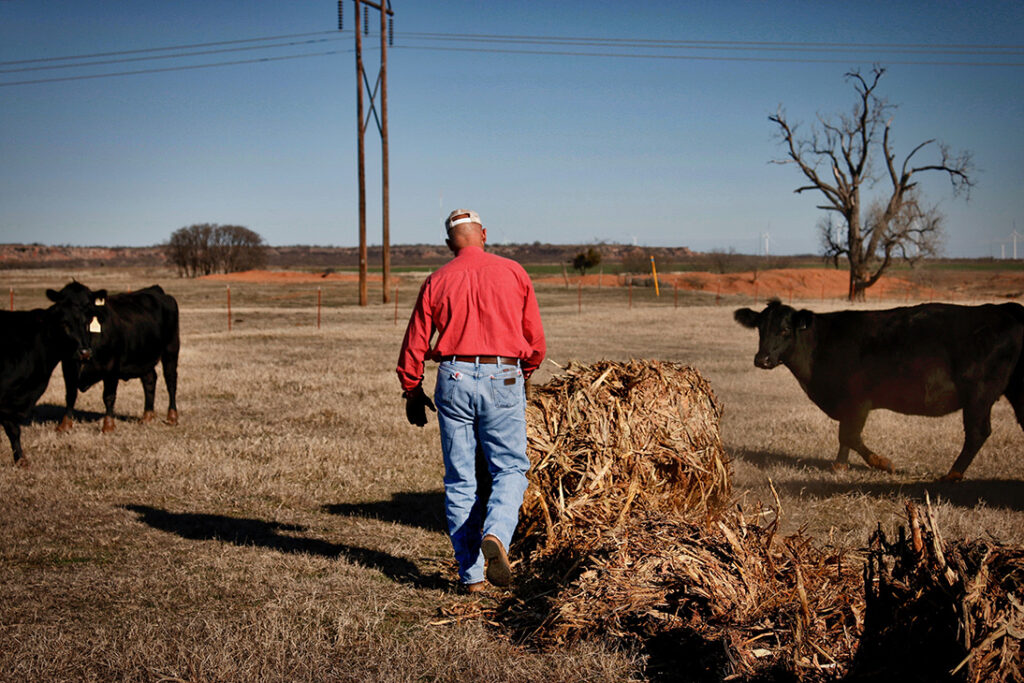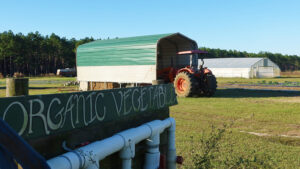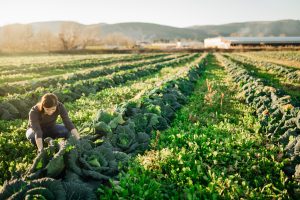Reposted from: https://prospect.org/power/2023-04-04-big-ag-lobbies-against-farmers/
At the end of Barack Obama’s presidency, two-term Secretary of Agriculture Tom Vilsack headed out for refuge in the private sector—a well-trodden path for ex-government officials. But in a sense, Vilsack never really left the orbit of the U.S. Department of Agriculture (USDA), which he now runs again under President Biden’s administration. Vilsack landed a million-dollar position as the top-paid executive for the U.S. Dairy Export Council, an interest group that represents the largest dairy conglomerates. USDEC has drawn the ire of small dairy farmers for opposing country-of-origin labeling, and rigging trade deals to dump dairy products in global markets, which causes price volatility.
The U.S. Dairy Export Council may sound like a garden-variety trade association. What makes it unusual though, is that its primary funding source comes directly from a government program known as the checkoff, funded by a mandatory fee on farmers large and small. In fact, all of the most powerful trade groups in agriculture, from the National Cattlemen’s Beef Association to the National Pork Producers Council, are bankrolled primarily by the checkoff program.
Checkoffs were originally intended to boost agricultural sales across sectors by paying for promotional campaigns, corporate partnerships, research, and product development. After decades of industry consolidation though, the large meatpackers and dairy processors control the labyrinthine chain of state councils and national boards that distribute the funds to contractors, most of which are lobbying groups in Washington. Checkoff dollars have become a slush fund captured by Big Ag to advance its own interests and crush any reforms to help small farmers using their own earnings.
Secretary Vilsack and Congress are now facing pressure to reform the program from a collection of over 130 groups representing small farmers, anti-monopolists, and animal welfare advocates. This week, the coalition sent a letter to Congress in support of the Opportunities for Fairness in Farming (OFF) Act, recently introduced by Sens. Cory Booker (D-NJ) and Mike Lee (R-UT), to bring oversight to the program and restrict any checkoff funds from going to lobbying groups. The legislation will face a forceful pushback from the very industry groups that rake in the vast majority of checkoff dollars and routinely block any reforms.
“America’s farmers and ranchers are tired of their checkoff tax dollars being funneled through the government and into the hands of trade and lobbying groups that work against fair competition and market transparency,” said Angela Huffman, vice president of Farm Action Fund.
THE PROGRAM DATES BACK to the 1980s farm crisis, though some versions of a checkoff fee existed earlier for cotton. The theory was that the slump in agriculture at the time required a coordinated effort by farmers to boost overall consumer demand for meat and dairy products, which would benefit all players in the industry.
The original ad campaigns paid for by the checkoff would end up defining the branding of several industries in the 1990s and 2000s. They include notorious marketing campaigns like “Beef: It’s What’s for Dinner,” as well as “Milk: It Does a Body Good.”
The market problems that led to the creation of the checkoff are completely inverted today. While the original goal was to increase consumption, now overproduction in agriculture to meet demand is leading to plummeting commodity prices. Only large packers and dairy processors producing at a massive industrial scale can weather those conditions.
At first, farmers voluntarily made payments into the fund, and were afforded some accountability on the use of these funds. If farmers didn’t approve of the allocation of funds, they could stop paying. But shortly after its inception, agricultural interests cajoled Congress into making the fees mandatory across sectors, a measure that legislators are now trying to roll back.
The checkoff program increasingly turned into a racket as the agriculture industry consolidated. The four largest meatpackers rolled up the market, forcing farmers into exploitative contracts, and horizontally expanding their own direct control of feedlots and hatcheries. In dairy, the four largest co-ops, led by Dairy Farmers of America, capture well over 50 percent of the market.
When the industry concentrated, checkoff soon became a tool for aiding ag monopolies, to the detriment of the small farmers who were paying into the program. Many farmers have attacked the long-standing promotional campaigns for product disparagement and even government-compelled speech. Critics of the checkoff took the program all the way to the Supreme Court in a 2005 First Amendment case. They lost, though similar cases continue to be filed and are currently making their way through lower courts.
A common disparagement case by farmers takes aim at the pork checkoff board’s contracts to develop its pioneering slogan “Pork. The Other White Meat,” which is still used to this day. In the latter half of the 20th century, Tyson Foods, one of the largest meat processors, successfully ramped up chicken sales in part by bombarding consumers with industry-funded research that it was significantly healthier than red meat. The slogan “The Other White Meat” was meant to help pork producers compete against chicken. The problem is that many independent farmers who helped pay for the slogan make their business from artisanal marbled coloring hogs. Farmers censured the pork checkoff board for disparagement of product using their own dollars, and have routinely taken legal action.
The beef checkoff faces a similar predicament with its “Beef: It’s What’s for Dinner” branding. By promoting beef through generic marketing, the ad campaign homogenizes the commodity.
“That slogan trains consumers to see all beef the same and then just look for the lowest costs, rather than allowing for domestic submarkets to develop which would benefit the independent owners,” said David Muraskin, the food project litigation director at Public Justice.
ALONG WITH PROMOTIONAL CAMPAIGNS, checkoff dollars also support corporate partnerships. Checkoff boards work with fast-food chains to develop new menu items that bolster dairy or meat sales, for example. Not only do these deals harm public health, but they only benefit large ag producers that can supply the bulk orders at low costs that fast-food chains require of their suppliers. Through contracts with Dairy Management Inc., the dairy checkoff recently used funds to develop extra cheese pizza at Domino’s and new dairy drinks at McDonald’s.
One of the dairy checkoff’s corporate sponsorships helped support the research and marketing for a new ultra-filtered milk product at the company Fairlife that was supposed to compete with protein drinks. After the rollout of the “revolutionary” product, supported by farmers’ dollars, the dairy giant Select Milk Producers helped fully sell off Fairlife to Coca-Cola in 2014.
“I paid for the development of that product and then Select Milk just pocketed my money and took the profit from that,” said Sarah Lloyd, an independent dairy farmer in Wisconsin who sat on the state checkoff board when they voted to approve the product development at Fairlife.
The OFF Act would bring more transparency to how checkoff funds are distributed. A Government Accountability Office report from 2017 raised red flags about the lack of USDA oversight of the checkoff program and recommended a number of transparency reforms. None of those measures have been taken up under Vilsack’s tenure.
The OFF Act’s other main objective is to limit the self-dealing of checkoff board members and lobbyists. The recipients of checkoff dollars are technically not allowed to use the funds for direct lobbying. But those restrictions have eroded over time and also don’t hold up under close scrutiny. The National Cattlemen’s Beef Association is a prime example of how trade groups corrupt the program. NCBA takes in the lion’s share of the beef checkoff program, worth around $45 million, and taps the fund for most of its operating budget. It’s self-evident that by taking funding from the checkoff program, NCBA can cross-subsidize its administrative, advocacy, and lobbying arms, which all exist under the same roof.
“Without the checkoff dollars, you wouldn’t have the NCBA in its current form, so it’s ridiculous to take at face value that this lobbying firewall really works,” said Bill Bullard, the CEO of R-CALF, a group representing independent cattle ranchers.
Because of a lack of transparency, information isn’t made available to farmers who pay for the program about the full extent of the contractor’s business operations. The NCBA routinely holds conferences and fly-ins attended by its own lobbyists and lawmakers, even though they don’t qualify as on-the-books lobbying.
SINCE THE NCBA BEGAN ADMINISTERING the checkoff boards, the U.S. has lost nearly half of its cattle producers, and the four largest meatpacking corporations captured 80 percent of the market. NCBA plays an active role in setting the conditions for the continued rollup of agriculture.
The fight over country-of-origin labeling (COOL) became a flashpoint for the conflicts of interest at the heart of the checkoff program. While raking in funds from small farmers, NCBA lobbied to repeal COOL in 2015, one of the few protections at the time for independent ranchers. Large meatpackers prefer to go to foreign sourcing for cattle to cut costs despite the worse quality of meat and the environmental effects of transportation. Small-scale ranchers who raise cattle humanely and with better sustainable practices want labels to distinguish their products. This March, the USDA announced a proposed rule to strengthen the voluntary “Product of USA” labels that certain farmers choose to put on their products. A full return of COOL, however, is not on the table and would likely face legal challenges through the World Trade Organization.
NCBA has also submitted public comments opposing the USDA’s proposed revamp of the Packers and Stockyards Act, a major piece of antitrust legislation that allows the department to break up the large meatpackers. NCBA is also lobbying against market reform legislation that would require meat processors to source over 50 percent of their cattle from independent producers.
While Secretary Vilsack has made curbing greenhouse gas emissions one of the USDA’s priorities, NCBA continues to receive both department grants and checkoff funding despite its lobbying efforts against environmental reforms. NCBA regularly funds research that throws into doubt the impacts of industrial farming on climate change, and helped kill the 2009 Waxman-Markey cap-and-trade bill. NCBA is currently working to water down a proposed Securities and Exchange Commission rule that would mandate greenhouse gas disclosures from publicly traded companies.
Under the OFF Act, NCBA could be cut off from receiving checkoff dollars entirely and at the very least would be forced to open its books to routine inspections. That would amount to a major overhaul of the program and victory for small farmers, if advocates can fight to include it in this year’s farm bill.





